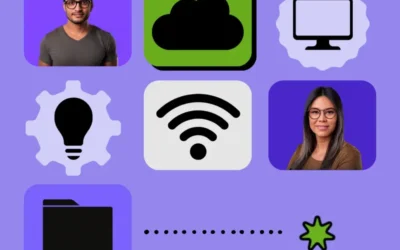Reservamos On-Road Talks features Grupo Flecha Amarilla’s Ricardo Pinto and Alberto Juárez, who discuss strategies for innovating bus operations and driver management with a focus on operations, maintenance, and training.
In the latest edition of Reservamos On-Road Talks, Ricardo Pinto, Planning and Operations Manager at Grupo Flecha Amarilla, and Alberto Juárez, Maintenance Manager at Grupo Flecha Amarilla, shared the talk Driving Towards the Future: Innovation in Driver Operations and Policies. They discussed key advances and strategies for optimizing bus management, focusing on operations, maintenance, and driver training.
Ricardo says the passenger transport industry must understand challenges and growth opportunities. Open forums like *Reservamos On-Road Talks* help build a stronger mobility community, enabling the exchange of ideas that further the industry’s progress, with a focus on the well-being of travelers, allies, employees, and the environment.
As a mobility company, Grupo Flecha Amarilla is committed to developing solutions that meet the needs of passenger and parcel transportation, addressing each link in this value chain. We focus on innovation and the development of our employees, and we are convinced that this is the only way to tackle the industry’s challenges.
Ricardo Pinto, Planning and Operations Manager at Grupo Flecha Amarilla.
Next, Ricardo and Alberto share their experience within Grupo Flecha Amarilla, which is facing significant challenges that resonate across the Latin American industry. What are the main challenges they identify? Road infrastructure, new technology integration, and driver training.
1. Innovation in Customer Experience and Cost Management
According to Alberto, the customer experience has evolved continuously, pushing companies to create comprehensive ecosystems for travelers. This approach includes everything from ticket purchasing and terminal service to interaction with the driver.
Flecha Amarilla has invested in on-board comfort, enhancing service through amenities like Wi-Fi and entertainment, and developing terminals that offer greater comfort and convenience for users. However, one of the greatest challenges is managing the costs of implementing these improvements. Alberto emphasizes the need to consider these expenses as long-term investments that generate value in both customer satisfaction and loyalty.
It’s not just about focusing on the bus. A customer is looking for an entire ecosystem, from where they buy their ticket, whether digitally or at the counter, to a waiting room that offers food, the boarding area, and interaction with the driver during boarding.
Alberto Juárez, Maintenance Manager at Grupo Flecha Amarilla.
2. Route Optimization and Demand Analysis
Ricardo emphasizes the importance of clearly defining the business model and using the appropriate technology for each type of route and service to reduce bus investment.
These assets are costly, and we have to aim to handle as much inventory as possible with fewer resources. We strive to be more profitable and have leaner assets.
Ricardo Pinto, Planning and Operations Manager at Grupo Flecha Amarilla.
Additionally, in collaboration with technology partners like *Reservamos SaaS*, Grupo Flecha Amarilla employs demand pattern analysis, allowing the company to adjust routes and optimize bus use. This strategy not only reduces operating costs but also adapts services to demand, ensuring agile and profitable operations.
The biggest lesson from the pandemic has been to be agile, increase operational efficiency, and optimize inventory based on market demand. We must prioritize productivity, especially in terms of operating costs.
Ricardo Pinto, Planning and Operations Manager at Grupo Flecha Amarilla.
For this reason, they consider it essential to explore solutions that provide real-time, timely data to inform decisions on operations and system optimizations.
3. Predictive Maintenance and Fleet Management
Flecha Amarilla performs predictive maintenance, or proper vehicle upkeep, providing a solid benchmark for travelers. According to Alberto, they implement strict maintenance through continuous monitoring with telematics platforms, allowing for anticipation and safety for both passengers and drivers.
We have a list of items that are preventively replaced based on the operation, even when the unit or part doesn’t show wear. We realize that this ‘expense’ is an investment that ensures good service and safety for everyone involved in the operation—passengers and drivers alike. Operationally, it also ensures the availability of an optimal fleet.
Alberto Juárez, Maintenance Manager at Grupo Flecha Amarilla.
Alberto also highlights the importance of efficient fleet management by tracking metrics such as fuel efficiency and tire wear. These metrics are complemented by driver training, ensuring optimal unit operation. For Flecha Amarilla, fuel consumption is one of the industry’s most significant expenses, making its management a daily priority.
Driver training and preventing drivers from operating a bus without the necessary training also greatly benefit fleet maintenance. It prevents misuse or improper operation from leading to long-term failures for Flecha Amarilla.
4. Technology and Road Safety
The use of telematics also plays a crucial role in operational safety and efficiency. This technology allows Flecha Amarilla to monitor driver behavior in real-time, from speed to abrupt braking.
Predictive maintenance, fleet management, and telematics are used to make us more efficient as a company and increase bus availability, thus enhancing traveler satisfaction.
Alberto Juárez, Maintenance Manager at Grupo Flecha Amarilla.
Meanwhile, Ricardo explains that safety and regulatory compliance are fundamental pillars of mobility services. Providing safe transport meets an expectation that travelers assume is given and that doesn’t need explicit communication.
However, it is crucial for Flecha Amarilla to maintain continuous driver training on road safety and traffic regulations. In a context where Mexico’s road infrastructure and traffic conditions present specific challenges, this training enables drivers to adopt a proactive attitude that reinforces passenger safety.
To ensure safety, Flecha Amarilla develops emergency protocols and logistics plans that guarantee service continuity, even in unforeseen circumstances, especially those arising from external factors.
Ricardo notes that there are tools today that help understand driver behavior. However, he emphasizes the importance of identifying what can be addressed in real-time and what should be studied based on trend data from bus sensors.
For instance, if I want to know what I need to train my driver in, I first have to study the trends and behaviors recorded by the bus sensors, then analyze them to determine where reinforcement or correction is needed through targeted, specific, and efficient training.
Ricardo Pinto, Planning and Operations Manager at Grupo Flecha Amarilla.
This monitoring and feedback approach has enabled the company to improve safety and create personalized training programs for each driver, thus enhancing the customer experience.
Innovation in the transport sector is essential to tackle the industry’s current and future challenges. Grupo Flecha Amarilla is leading the change by integrating advanced technology into its operations, proactively managing fleet maintenance, and promoting continuous driver training.
As the industry advances, the commitment of companies like Flecha Amarilla to innovation and customer satisfaction sets them as role models, ensuring efficient, safe transportation and a high-quality user experience.




